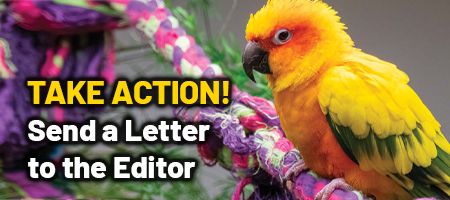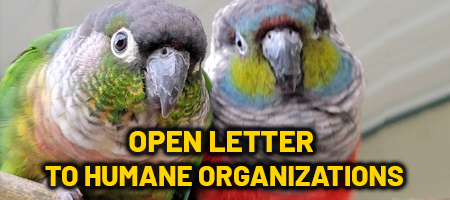National Bird Day – January 5th
Each year, millions of birds are captured from the wild or produced in captivity for commercial profit or human amusement, only to languish in conditions that fail to meet the instinctive behavioral and physical needs of these wild animals.Birds are More Beautiful Wild.
The Avian Welfare Coalition’s National Bird Day campaign aims to reduce the suffering of birds by raising public awareness of the destructive bird trade, the realities of cruel bird breeding mills, and ways to improve the welfare of birds already in captivity.
Wild at Heart: Birds in Captivity
Even when bred in captivity, exotic birds are not considered domesticated animals. They are the native species of other countries and all of their inherent behavioral and physical needs remain intact. Sadly, when it comes to birds, deprivation of their natural behaviors (to fly and flock, for example) is an inescapable component of their captivity.
Confinement in cages can lead to neurotic behavior, excessive screaming, feather plucking, self-mutilation, and other destructive habits. Very few people are capable of meeting the special needs of captive exotic birds.
Exotic bird sanctuaries across the country are overwhelmed with hundreds of unwanted and abused birds in need of rescue and life-long homes, while thousands more languish deprived and ignored in their cages because their “owners” have lost interest in them. Others are simply released to fend for themselves; most of these birds will perish.
Meanwhile, pet stores and breeders across the United States continue to treat birds like merchandise, peddling them into the pet trade.
Read more about captive birds here: http://www.avianwelfare.org/issues/pets.htm
Read more about bird mills and bird sales here: http://www.avianwelfare.org/issues/marketing.htm
Wilderness Lost: The Wild Bird Trade
Each year, thousands of parrots are taken from the wild to be sold as pets. The initial shock of losing their freedom and being confined to a cage can kill many wild-caught birds. It has been estimated that 60 percent of wild-caught birds die before reaching international markets. To compensate for mortalities, up to four times as many parrots are captured than make it to market.
The demand for birds as pets or as breeding stock for captive breeding is the driving force behind the cruel trade in wild-caught birds. Globally, the illegal trade in wildlife is second only to that of drugs.
The popularity of birds as “pets” in the U.S., whether captive-bred or wild-caught, influences global trends, thereby influencing the global trade in wildlife species around the world.
Born to Be Wild: Wild Bird Conservation
Replacing the demand for birds as “pets” with a demand for preserving the species in the wild will reduce inherent welfare problems associated with captive birds while increasing the support of conservation efforts, such as ecotourism, that help local communities and protect wildlife by allowing people to see that birds are more beautiful wild.
Read more about conservation here: http://www.avianwelfare.org/issues/conservation.htm
Celebrate National Bird Day:
- Take Action! Send a Letter to the Editor
- Spread the word by shopping at our store
- Distribute AWC educational materials.
- Visit and share AWC on social media
Facebook
National Bird Day
Instagram
Twitter
More Ways to Celebrate National Bird Day:
- Educate children about the plight of captive birds and importance of conservation with our children’s book “Lucky” http://www.luckythelorikeet.com/
- Don’t patronize stores that sell birds or that use them for display. Let them know why you are taking your business elsewhere.
- Support reputable bird rescues and sanctuaries. More about sanctuaries here: http://www.avianwelfare.org/issues/sheltering.htm
- Take a trip to see parrots in their natural habitat and support conservation organizations working to protect birds in the wild. Recommended organizations include:
- One Earth Conservation: https://www.oneearthconservation.org/
- Hatched to Fly Free: https://www.fosterparrots.com/hatched-to-fly-free
- Thrive Conservation: https://thriveconservation.org/
- Watch a documentary on the wild bird trade
Broken Wings is a unique documentary--music film that tells the untold story of bird poaching around the world.
https://www.waterbear.com/watch/broken-wings






